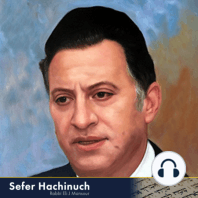20 min listen
Misva #116: The Minha Offering
FromSefer Hachinuch
ratings:
Length:
20 minutes
Released:
Jan 13, 2022
Format:
Podcast episode
Description
One of the sacrifices discussed in the first section of the Book of Vayikra is the Minha offering, which was unique in that it involved not an animal, but rather flour. The Sefer Ha’hinuch lists the procedure for offering the Minha as the 116 th Biblical command. He explains that the purpose of this offering is “Hachna’at Ha’yeser” – subduing the evil inclination. When a person sees that his hard-earned assets are burned in fire because of his wrongdoing, he will be deterred from misconduct in the future, and will be more likely to restrain his sinful instincts. The word “Minha” means “gift,” and the Sefer Ha’hinuch presents two explanations for why the Torah uses this word in reference to the grain offering. First, he writes, the word “Minha” has the specific connotation of a small gift, like a small present one gives his fellow as a symbolic gesture in the hope of earning his favor. The Minha offering, of course, was far smaller and less costly than animal sacrifices, and so it is referred to with the term “Minha.” Secondly, the Sefer Ha’hinuch writes, the word “Minha” refers to a gift given voluntarily, and it is therefore used in reference to the grain offering, which was primarily offered as a voluntary sacrifice, notwithstanding the fact that some Minha offerings were obligatory (as we will soon see). The Sefer Ha’hinuch lists three special Minha offerings which were brought on behalf of the entire nation: the Omer offering from the first harvested grain, which was offered on the second day of Pesach; the “Sheteh Ha’lehem” offering, which consisted of two leavened loaves and offered on Shabuot (marking the only time when a Minha was prepared as Hametz); and the “Lehem Ha’panim” – the bread baked each week and placed on the Shulhan (table in the Bet Ha’mikdash). The Sefer Ha’hinuch then lists the nine types of Minha offerings which were brought by individuals: 1) Minhat Hoteh – a sinner’s offering. In some situations, a sinner who must offer an atonement offering, but cannot afford an animal, is allowed to bring the less expensive Minha offering, instead. 2) Minhat Kena’ot – the Minha offering brought by a woman suspected of marital infidelity (“Sota”) as part of the special process by which her guilt or innocence was determined. 3) Minhat Hinuch – the Minha offering brought by every Kohen the first day he began serving as a Kohen. 4) Minhat Habitin – the Minha offering brought each day by the Kohen Gadol. 5) Minhat Solet – a voluntary offering consisting of raw flour and oil. 6) Minhat Mahabat – a voluntary offering consisting of flour fried in oil in a shallow pan. 7) Minhat Marheshet – a voluntary offering consisting of flour deep fried in oil. 8) Minhat Ma’afeh Tanur – a voluntary offering consisting of flour and oil that were baked into thin crackers in an oven. 9) A second type of Minhat Ma’afeh Tanur, which was baked into thick loaves, as opposed to thin crackers. The person who brings a Minha offering would place the offering in a metal utensil and give it to a Kohen. The Kohen would consecrate the utensil, and bring it to the top of the altar. He would take a “Kometz” (“handful”) and place it onto the fire on the altar, and the rest would be eaten by the Kohanim. This Misva applies during the times of the Bet Ha’mikash, and to the Kohanim. A Kohen who did not follow the prescribed procedure for the offering of the Minha has violated this affirmative command. A person who vowed to offer a voluntary offering and failed to do has transgressed the separate Misva forbidding violating one’s vows.
Released:
Jan 13, 2022
Format:
Podcast episode
Titles in the series (100)
Misva #19: The Prohibition Against Eating Hametz on Pesach: Daily Sefer Hachinuch - Brought to you by itorah.com by Sefer Hachinuch
